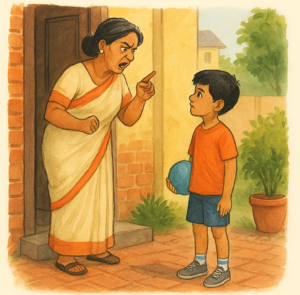By Pranti Pradhan
The Angry Neighbor and the Quiet Boy

One sunny afternoon in a small neighborhood, Ayaan was playing with his ball in the courtyard. He wasn’t being noisy—just quietly tossing the ball against the wall, catching it, and repeating.
Suddenly, his neighbor, Mrs. Kapoor, came out of her house looking upset. Her face was red, and her voice was loud.
“Stop that noise at once!” she shouted. “You children have no manners! Don’t you know how to behave?”
Ayaan froze, surprised. He hadn’t expected this reaction. He wasn’t playing loudly or disturbing anyone. But Mrs. Kapoor’s words stung. She sounded harsh—and other neighbors who were nearby looked up. A few even chuckled uncomfortably.
Ayaan’s eyes dropped to the ground. He didn’t reply. He simply picked up his ball and walked back to his doorstep.
Later, his friend Aarav, who had seen the whole thing, came over and said, “Why didn’t you say something back, Ayaan? She was totally rude! I would’ve shouted back at her!”
Ayaan sat down on the steps and looked thoughtful.
“I was hurt when she shouted,” he said softly. “It felt unfair. But I didn’t want to shout back.”
“Why not?” Aarav asked. “Weren’t you angry?”
“I was, a little. But then I really looked at her face. Her voice wasn’t just angry—it was shaky. Her eyes looked tired. I think… maybe something else is bothering her today. Not just me and my ball.”
Aarav frowned. “So you’re saying she was upset about something else, but she shouted at you?”
“Maybe,” Ayaan said gently. “Sometimes, when people carry a storm inside, they pour it out on the nearest person—even if that person didn’t cause it. If I had shouted back, it would have made the storm bigger. Instead, I tried to listen… not just to her words, but to what was behind them.”
Aarav was quiet for a moment. “But it still wasn’t fair.”
“No, it wasn’t,” Ayaan agreed. “But listening deeply helped me understand her, not just get angry at her. And when I understood her pain, I stopped feeling angry inside. I felt calm.”
The next morning, something unexpected happened.
Mrs. Kapoor knocked on Ayaan’s door. When he opened it, she looked a bit embarrassed.
“I wanted to say sorry, Ayaan,” she said. “I was having a rough day yesterday—some bad news from my sister, and then I saw you playing, and I just… I took my frustration out on you. That wasn’t right.”
Ayaan smiled kindly. “It’s okay,” he said.
She smiled back. “Thank you for being so patient. You taught me something.”
From that day on, their bond grew warmer. And Aarav began to understand what Ayaan meant.
🌟Moral of the Story🌟
Sometimes people speak harshly not because of us, but because of their own hidden hurt. If we only react to their words, we carry the storm inside ourselves. But if we pause, listen deeply, and try to understand their feelings, we stop the cycle of anger.
Like Ayaan, when we stop reacting to what people say and begin listening to why they say it—with quiet awareness and care—we find peace within. That is the power of true listening.



